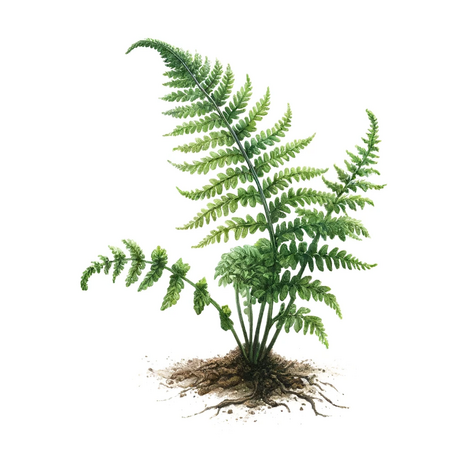Pteridium aquilinum

What is bracken fern?
Bracken fern (Pteridium aquilinum) is a species of fern that grows in various climate zones around the world. This plant is particularly robust and can thrive in a wide range of conditions, from open fields to shady woodlands. Its characteristic feature is the large, feathery leaf structure, which is reminiscent of an eagle's wings - hence the name.
Introductory paragraph
Before we look at the specific advantages and disadvantages of bracken fern in dog nutrition, it is important to develop a basic understanding of this plant. Bracken is interesting not only because of its wide distribution and adaptability, but also because of its unique constituents, which can have both positive and negative effects on health.
Benefits of bracken fern in dog nutrition
Although bracken fern is not traditionally considered a dietary supplement for dogs, there are theoretical considerations for potential benefits based on its ingredients.
Natural source of nutrients
- Vitamins and minerals: bracken may contain trace amounts of vitamins and minerals that may be important for the overall health of dogs. However, the exact composition is highly dependent on the growing conditions.
Antioxidant properties
- Fighting free radicals: Some plants, which may include certain fern species, have antioxidant properties that help neutralize harmful free radicals in the body.
Disadvantages and risks of bracken fern
Despite potential benefits, the risks and disadvantages of bracken fern outweigh the benefits, especially in relation to dog nutrition.
Toxicity
- Thiaminase: bracken fern contains thiaminase, an enzyme that breaks down vitamin B1 (thiamine). Long-term ingestion can lead to vitamin B1 deficiency, which can cause serious neurological disorders in dogs.
- Carcinogenic substances: Some studies suggest that bracken fern contains carcinogenic substances that could increase the risk of cancer.
Digestive problems
- Irritation and allergies: The raw or inadequately processed parts of bracken fern can cause digestive problems, such as nausea, vomiting and diarrhea.
Final assessment
Bracken is a fascinating plant with a rich history and impressive adaptability to different environments. Despite its potential nutrients and antioxidant properties, the significant risks and disadvantages associated with its use in dog nutrition should not be underestimated. The toxicity and potential long-term health consequences make bracken fern an ingredient that should be treated with extreme caution.
It is essential that dog owners are aware of the potential dangers that some natural plants, including bracken, can pose. The health and well-being of our dogs should always come first. It is therefore advisable to be fully informed before introducing any new ingredients into a dog's diet and, if in doubt, seek professional advice. Bracken may be an impressive sight in the wild, but it has no place in our dog's food bowl.
Properties 4
Are you looking for other ingredients with a specific property?
Just click on them to find more.
If you notice any signs of hypersensitivity or poisoning in your dog, you should see your vet immediately. We are not a substitute for a vet, but we try to be as accurate as possible. Every dog reacts differently and we recommend you get a second opinion or consult your vet if in doubt.
Stay healthy and take good care of your four-legged friend!😊
Similar to Pteridium aquilinum
Worm ferns belong to the fern family and include several species known by the genus name Dryopteris. They often grow in moist, shady forests and are known for their dense, green leaves and their...
Ribbed fern belongs to the Blechnaceae family and is characterized by its dark green, shiny leaves, which at first glance might resemble ribs. This perennial plant prefers shady, moist locations and...
The common spotted fern, known by its scientific name Polypodium vulgare, is a species of fern found in many parts of the world. It is characterized by its long-lived, evergreen fronds, which make...
Shield ferns belong to the Polypodiopsida family and are characterized by their umbrella or shield-shaped fronds, from which they get their name. These ferns are found in various climate zones...



